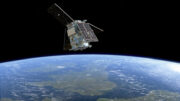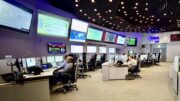One last team photo before launch. Today, at ESA’s ESOC mission control centre, in Darmstadt, Germany, the Biomass team gathered for the pre-launch briefing.
ESA’s forest satellite, to be flown from ESOC, is scheduled for launch from Europe’s Spaceport in Kourou, in French Guiana, on 29 April.
Biomass is one of ESA’s Earth Explorer missions and, like other Earth Explorers, it uses advanced space technology to provide new data. Biomass will advance our understanding of forests and their importance in the carbon cycle and climate.
Over the winter, a large team at ESA’s European Space Operations Centre (ESOC) has been preparing and rehearsing for the satellite’s first and most critical moments in space – the ‘Launch and Early Orbit’ phase.
Counting to bit over a hundred people, this ‘team of teams’ gathers engineers and scientists – working in the ground segment, flight dynamics, software and networks – as well as experts from the satellite’s manufacturer and instrument teams.
Shaping this team into a single cohesive unit is the goal of this ‘simulation campaign‘.
As part of it, the team is faced with many events, from software errors to critical failures, specifically designed to test its capabilities to identify issues, adapt the mission’s timeline and, more generally, work under stress and time pressure.
Preparations, rehearsals, briefings, and team photos now complete, mission control is GO for launch!
Follow @esa and @esaoperations on BlueSky for live updates on launch day.
- CREDIT
ESA - LICENCE
ESA Standard Licence
About ESA :
The European Space Agency (ESA), established in 1975, serves as Europe’s gateway to space exploration and utilization. This intergovernmental organization, comprising 23 member states, is headquartered in Paris and coordinates Europe’s space endeavors, pooling financial and intellectual resources for projects far exceeding the capacity of individual nations.
ESA’s mission encompasses a wide array of activities, including Earth observation, space science, robotics exploration, human spaceflight, satellite navigation, telecommunications, and the development of launch vehicles like Ariane and Vega. By fostering innovation and collaboration, ESA aims to shape Europe’s space capabilities, ensuring that investments in space deliver tangible benefits to European citizens and the world.
With a strong focus on scientific discovery, technological advancement, and addressing global challenges such as climate change and space safety, ESA plays a pivotal role in advancing our understanding of the universe and leveraging space for the betterment of humankind. Its numerous successful missions, like Rosetta, Mars Express, and the development of Galileo, underscore its significant contributions to space exploration and technology.
Source : ESA









Be the first to comment on "Mission control GO for Biomass launch"